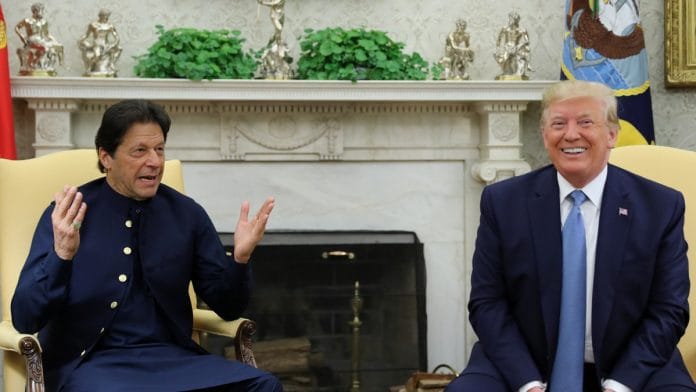New Delhi: US President Donald Trump’s “seemingly warm” welcome to Pakistan Prime Minister Imran Khan on his July 2019 visit and his subsequent offer to mediate on Kashmir might have triggered the Modi government’s 5 August 2019 decision to scrap articles 370 and 35A. This is an assessment made in a report prepared by a research agency attached with the US Congress.
“Trump’s Kashmir mediation claims were especially jarring for many Indian observers, some of whom began questioning the wisdom of Modi’s confidence in the United States as a partner,” said the report of the Congressional Research Service (CRS), released last month.
“The episode may have contributed to India’s August moves,” the 24-page report added.
The CRS is tasked with providing non-partisan analysis to US Congress members on matters that may come up before the American parliament. CRS reports are not considered to be views of the US Congress.
In July 2019, Khan made his first US trip as prime minister.
According to the report, the manner in which President Trump welcomed Khan in Washington had “elicited disquiet among many Indian analysts”. The interaction, the report said, was seen by these analysts as yet another attempt by the US to link India and Pakistan.
It also referred to “disquiet” in India on account of the US’ support for the International Monetary Fund (IMF) bailout for Pakistan last year — the country’s 13th since the late 1980s.
Also Read: ‘Came on cancelled visa’ — British MP critical of Article 370 move denied entry into India
A ‘warm’ welcome for Khan
The CRS report stated that the main reason behind Trump’s “seemingly warm welcome” to Khan was the US’ desire for Pakistan’s help in pulling out its troops from Afghanistan.
While Khan was in the US, Trump said Prime Minister Narendra Modi had sought American mediation on the Kashmir issue when they met in Osaka for the G-20 Summit in June.
This goes against India’s long-held stand that Kashmir is a bilateral issue that doesn’t warrant outside influence, and sits in line with Pakistan’s repeated efforts to internationalise the dispute.
India had subsequently issued a categorical rejection of the statement.
“President Trump’s apparent bonhomie with Pakistan’s prime minister and offer to mediate on Kashmir in July was taken by some as a new and potentially unwise strategic shift,” the report said.
The report also stated that, contrary to the Modi government’s claims about J&K’s poor economic standing, its economic situation was better than other Indian states when it was stripped of its special status and split into two union territories.
Another factor cited for Delhi’s 5 August decision was to “shift national conversation” from “negative economic news” — increasing criticism of the government on economic grounds led “some analysts to suspect that Modi and his lieutenants were eager to play to the BJP’s Hindu nationalist base and shift the national conversation”.
‘US needs India to counter China’
The report sought to highlight the fact that the India-US relationship had “grown stronger in the last decade”, while Washington’s equation with Islamabad remained “clouded by mistrust”.
“The administration views India as a key ‘anchor’ of its ‘free and open Indo-Pacific’ strategy, which some argue is aimed at China. Yet any US impulse to ‘tilt’ toward India is to some extent offset by Islamabad’s current, and by most accounts vital, role in facilitating Afghan reconciliation negotiations,” the report added, quoting analyses and media reports.
Also Read: Ayodhya, Article 370, triple talaq done, these are the next things on Modi-Shah’s agenda
What are CRS reports, and their relevance
The CRS is a division of the Library of Congress. Under the Legislative Reorganization Act of 1946, it was officially named the Legislative Reference Service, given permanent status as a separate department within the library, and directed to employ senior specialists in various programme areas. The Legislative Reference Service was renamed the Congressional Research Service under the Legislative Reference Act of 1970.
The reports were made public in 2018, with online access available as well. They are written by individual analysts, who can source their material from inputs, analytical columns and media reports.
Also Read: ‘Kashmir is fine’: New group of foreign envoys visits J&K, tweet sparks controversy







Too profound a decision to have been influenced by such a transient consideration. The lack of future planning is showing up. Kashmir’s economy has suffered a missile strike. The people are sullen, resentful. Fortunately, there has not been any violence or notable loss of life. The political process, even earlier not satisfying to Kashmiris, is in deep freeze. Indian diplomats are moving with fire extinguishers. As consequential a decision as Demonetisation.